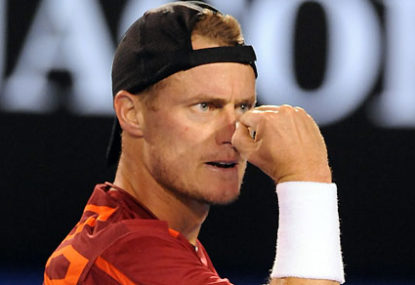Sweet revenge for Rafa as de Minaur downed to keep legend's Madrid fairytale alive
Alex de Minaur has missed out on the chance of a lifetime to beat Rafael Nadal on clay in successive tournaments, blown away by…

He will go down as one of our greatest ever athletes, yet he’s far from the best in his sport. In fact, his record at the majors isn’t even at the top of Australia’s list. But statistics and wins don’t tell the full story of Lleyton Hewitt.
This month, the boy from Adelaide’s name will be among the 128 starters in the Australian Open men’s draw, just as it was in 1997 when he was 15 years old.
His form for his 19th appearance differs from his 18th, when he beat Roger Federer in the final of the Brisbane International. This year Hewitt enters on the back of a first-round loss to compatriot Sam Groth. But even that won’t diminish the life of the 33-year-old.
“All my practice sets have been first class,” said Hewitt after the loss.
“I’ve got to still try and stay as positive as can be. But then again I won here last year and then lost first round in the open, so it’d be nice if I could do a bit better in the Aussie Open and lose first round here.”
To realise the extent of Hewitt’s remarkable career, you have to go back to the beginning. When most kids were serving burgers, Hewitt was serving sliders as the Australian Open’s youngest ever player.
The following year, ranked 550 in the world, more records tumbled, as the baseliner took out Andre Agassi on his way to victory in Adelaide. He became the lowest ranked player to win an ATP event, at 16 years of age.
From there the nation became part of a great sporting journey. By the end of 2001, Hewitt had the US Open trophy in the garage, and was the youngest male ever to the number one ranking, a position he held for a total of 80 weeks. A year later he would mend the broken hearts of Australian tennis fans – suffered after Goran Ivanisevic denied Pat Rafter the Wimbledon crown in five gruelling sets – and claim the most prestigious individual trophy in the game.
Despite winning Wimbledon just four years after turning professional, another major title has since eluded Hewitt, more a victim of his time than a drop in performance. In 2004, Hewitt made another Grand Slam final, this time against a man who will go down as arguably the greatest player of all time: Roger Federer.
Hewitt can take solace knowing he was the last player to dominate the game before the golden era of Federer, then Federer and Rafael Nadal, and then the ‘Big Four’ took over.
What adds to the story is the recent seasons and struggles on tour. His best tennis is behind him, but that’s not to say great tennis isn’t within him. The losses occur more often, to names we’ve never seen, or pronounced, but all that is worth it for those couple of tournaments a year when it all comes together, like it did in Brisbane last year.
Many have come and gone in Hewitt’s time in the men’s game, but Australia’s most successful Davis Cup player remains. When his time does come to leave the broken strings in the racquet, or catch up with Tony Roche over a beer and not the game tape, he can do so knowing the game is in the best hands it’s been in since he entered aged 15 years and 11 months. His good mate Rafter is in charge of player development at Tennis Australia, and for once the talent pool looks to be filling.
So what should we expect from this fighting warrior over two weeks at Melbourne Park?
“As you get into the 30s, it’s harder to get yourself up for matches – I know,” legend Rod Laver told reporters last week. “But I think he will still have a good Australian Open.
“He’s not a young player any more but he’s a talent – he’s been brilliant since he was 16.”
Whether Hewitt can beat last year’s effort, or even make the second week remains to be seen. But whatever happens, there’ll be nothing left on the court, because it’s all he’s known since his mates were flipping burgers.